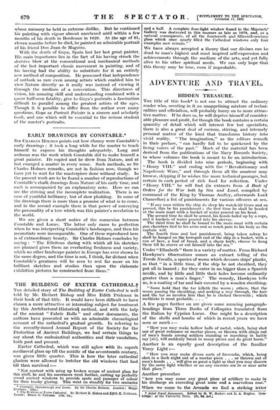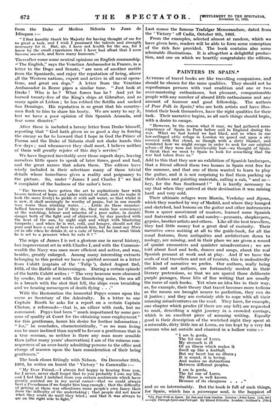ADVENTURE AND TRAVEL.
HIDDEN . TREASURE.
THE title of this book* is not one to attract the ordinary reader who, scenting in it an unappetizing mixture of techni- calities and officialism, will probably hurry on to more attrac- tive matter. If he does so, he will deprive himself of consider- able pleasure and profit, for though the book contains a certain quantity of detail which will interest few but specialists, there is also a great deal of curious, stirring, and intensely personal matter of the kind that transforms history into vivid reality. " The imagination," as the editors remark in their preface, " can hardly fail to be quickened by the living voices of the past." Much of the material has been derived from the publications of the Navy Records Society, to whose volumes the book is meant to be an introduction.
The book is divided into nine periods, beginning with " Henry VIII." and ending with the " Revolutionary and Napoleonic Wars," and through them all the amateur may browse, skipping if he wishes the more technical passages, but certain in each period of rich food for reflection. Under " Henry VIII." he will find (in extracts from A Book of Orders for the War both by Sea and Land, compiled by command of the King by Thomas Audley, afterwards Lord Chancellor) a list of punishments for various offences at sea.
" If any man within the ship do sleep his watch iiii times and so proved, this be his punishment : the first time he shall be headed at the main mast with a bucket of water poured on his head.
The second time he shall be armed, his hands haled up by a rope, and ii buckets of water poured into his sleeves.
The third time he shall be bound to the main mast with certain gun chambers tied to his arms and as much pain to his body as the captain will.
The fourth time and last punishment, being taken asleep he shall be hanged on the bowsprit end of the ship in a basket, with a can of beer, a loaf of bread, and a sharp knife, choose to hang there till he starve or cut himself into the sea."
Under "Elizabeth" there is a variety of matter. From Richard Hawkyns's Observations comes an extract telling of the Teredo Navalis, a species of worm which devours ships' planks, so that " in a little time, if the ship be not sheathed, they put all in hazard ; for they enter in no bigger than a Spanish needle, and by little and little their holes become ordinarily greater than a man's finger." The remedy, Hawkyns tells us, is a coating of tar and hair covered by a wooden sheathing.
" Some hold that the tar killeth the worm ; others, that the worm passing the sheathing, and seeking a way through, the hair and the tar so involve him that he is choked therewith ; which methinks is most probable. . . . "
A few pages further on are given some amusing paragraph- headings from Three Books of Colloquies translated from the Italian by Cyprian Lucar. One might be a description of the shells and bombs of which in recent years we have seen so much :—
" How you may make hollow balls of metal, which, being shot out of great ordnance or mortar pieces, or thrown with slings out of men's hands among soldiers standing or marching in battle ray [sic], will suddenly break in many pieces and do great harm."
Another is an equally good description of the familiar Verey Light :-
" How you may make divers sorts of fireworks, which, being shot in a dark night out of a mortar piece . . . or thrown out of men's hands . . . will give so great a light as that you may discern by the same light whether or no any enemies are in or near unto that place."
Another prescribes
" how you may cause any great piece of artillery to make in his discharge an exceeding great noise and a marvellous roar."
When we come to the Armada we find a striking letter
• Natal Naval Docurnsnts. Edited by H. W. Hodges and E. A. Hughes. Cam- bridge: at the Univerzity Press. [8v, ad, net.] from the Duke of Medina Sidonia to Juan de Idiaquez :- " I first humbly thank his Majesty for having thought of me for so great a task, and I wish I possessed the talents and strength necessary for it. But, sir, I have not health for the sea, for I know by the small experience that I have had afloat that I soon become sea-sick, and have many humours."
Thereafter come some neutral opinions on English seamanship. 0 The English," says the Venetian Ambassador in France, in a letter to the Doge and Senate, " are men of another mettle from the Spaniards, and enjoy the reputation of being, above all the Western nations, expert and active in all naval opera- tions, and great sea dogs." A letter from the Venetian Ambassador in Rome pipes a similar tune. " Just look at
Drake ! Who is he ? What forces has he ? And yet he burned twenty-five of the King's ships at Gibraltar, and as many again at Lisbon ; he has robbed the flotilla and sacked
San Domingo. His reputation is so great that his country- men flock to him to share his booty. We are sorry to say it, but we have a poor opinion of this Spanish Armada, and fear some disaster."
After these is included a breezy letter from Drake himself, reporting that " God hath given us• so good a day in forcing the enemy so far to leeward that I hope in God the Prince of Parma and the Duke of Sidonia shall not shake hands this few days ; and whensoever they shall meet, I believe neither of them will greatly rejoice of this day's service."
We have lingered inevitably over those superb days, leaving ourselves little space to speak of later times, good and bad, and the great names that adorn them. The editors have wisely included in their selections many of those trivial details whose homeliness gives a reality and poignancy to the picture. So, under " James I and Charles I" we find a complaint of the badness of the sailor's beer.
" The brewers have gotten the art to sophisticate beer with broom instead of hops, and ashes instead of malt, and (to make it look the more lively) to pickle it with salt water, so that whilst it is new, it shall seemingly be worthy of praise, but in one month wax worse than stinking water.. . . Little do these monster- bellied brewers think (or if they do, they make less conscience) of the watching, labour and miseries of a poor sailor, in double danger both of the fight and of shipwreck, by day parched with the heat of the sun, by night nipt and whipt with blustering tempests ; and when he is wet, cold, and hungry, should not the poor soul have a can of beer to refresh him, but he must say Mars est in olla when he drinks it, or a cake of bread, but he must think he is set to a penance when he eats it ? "
The reign of James I is not a glorious one in naval history, but improvement set in with Charles I, and with the Common-
wealth the Navy was once more efficient and active, and was, besides, greatly enlarged. Among many interesting extracts belonging to this period we have a spirited account in a letter from Cubitt (captain of the ' Tulip '), dated August 2nd, 1653, of the Battle of Scheveningen. During a certain episode of the battle Cubitt writes : " The very heavens were obscured by smoke, the air rent with the thundering noise, the sea all in a breach with the shot that fell, the ships even trembling and we hearing messengers of death flying . . ."
With the Restoration the immortal Pepys comes upon the
scene as Secretary of the Admiralty. In a letter to. one Captain Rooth he asks for a report on a certain Captain
Clinton, a reformado—that is, an officer with rank, but no command. Pepys had been " much importuned by some per- sons of quality at Court for the obtaining some employment" for this gentleman, hence his desire for further information ; " for," he concludes, characteristically, " as no man living can be more inclined than myself to favour a gentleman that is a true seaman, so neither is there any man more sensible than (after many years' observation) I am of the ruinous con- sequences of an over-hasty admitting persons to the office and charge of seamen upon the bare consideration of their being gentlemen."
The book closes fittingly with Nelson. On December 30th, 1804, he writes on board the Victory' to Cornwallis :—
" My Dear Friend,—I always feel happy in hearing from you, for I never, never shall forget that to you probably I owe my life, and I feel that I imbibed from you certain sentiments which have greatly assisted me in my naval career—that we could always beat a Frenchman if we fought him long enough ; that the difficulty of getting at them was oftentimes more people's own fancy than from the difficulty of the undertaking ; that people did not know what they could do until they tried; and that it was always to err on the right side to fight."
Last comes the fatuous Trafalgar Memorandum, dated from the ' Victory' off Cadiz, October 9th, 1805.
From the examples, selected almost at random, which we have given here, readers will be able to form some conception of the rich fare provided. The book contains also some admirable illustrations. It is altogether a delightful produc- tion, and one on which we heartily congratulate the editors.



























































 Previous page
Previous page